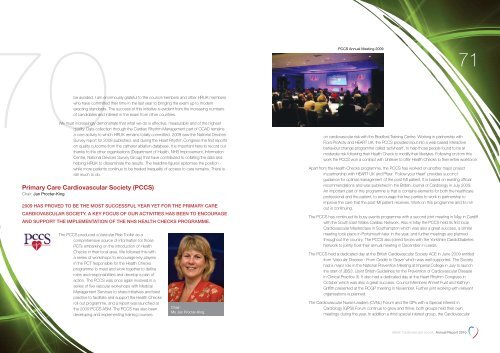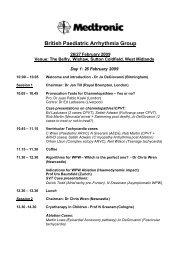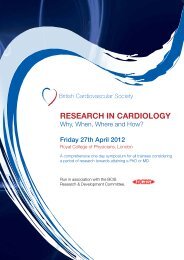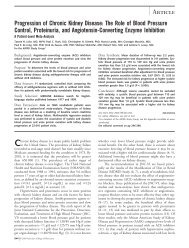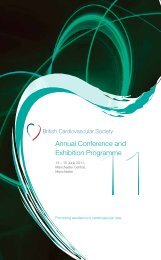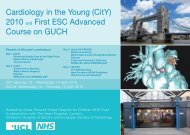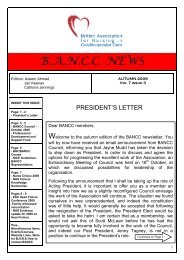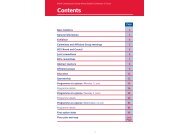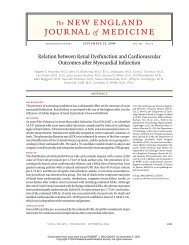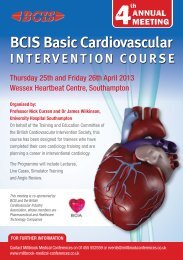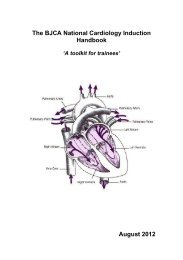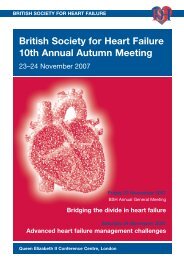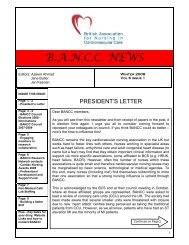BCS Annual Report 2010 - British Cardiovascular Society
BCS Annual Report 2010 - British Cardiovascular Society
BCS Annual Report 2010 - British Cardiovascular Society
- No tags were found...
Create successful ePaper yourself
Turn your PDF publications into a flip-book with our unique Google optimized e-Paper software.
0be avoided. I am enormously grateful to the council members and other HRUK memberswho have committed their time in the last year to bringing the exam up to modernexacting standards. The success of this initiative is evident from the increasing numbersof candidates and interest in the exam from other countries.We must increasingly demonstrate that what we do is effective, measurable and of the highestquality. Data collection through the Cardiac Rhythm Management part of CCAD remainsa core activity to which HRUK remains totally committed. 2009 saw the National DevicesSurvey report for 2008 published, and during the Heart Rhythm Congress the first reportson quality outcome from the catheter ablation database. It is important here to record ourthanks to the other organisations (Department of Health, NHS Improvement, InformationCentre, National Devices Survey Group) that have contributed to collating the data andhelping HRUK to disseminate the results. The headline figures epitomise the position -while more patients continue to be treated inequality of access to care remains. There isstill much to do.Primary Care <strong>Cardiovascular</strong> <strong>Society</strong> (PCCS)Chair: Jan Procter-King2009 has proved to be the most successful year yet for the Primary Care<strong>Cardiovascular</strong> <strong>Society</strong>. A key focus of our activities has been to encourageand support the implementation of the NHS Health Checks programme.The PCCS produced a Vascular Risk Toolkit as acomprehensive source of information for thosePCTs embarking on the introduction of HealthChecks in their local area. We followed this witha series of workshops to encourage key playersin the PCT responsible for the Health Checksprogramme to meet and work together to defineroles and responsibilities and develop a plan ofaction. The PCCS was once again involved in aseries of five vascular workshops with MedicalManagement Services to share initiatives and bestpractice to facilitate and support the Health Checksroll out programme, and a report was launched atthe 2009 PCCS ASM. The PCCS has also beendeveloping and implementing training coursesChair:Ms Jan Procter-KingPCCS <strong>Annual</strong> Meeting 200971on cardiovascular risk with the Bradford Training Centre. Working in partnership withFlora ProActiv and HEART UK, the PCCS provided input into a web-based interactivebehaviour change programme called ‘activheart’, to help those people found to be atmoderate risk following their Health Check to modify their lifestyles. Following on from thiswork the PCCS won a contract with Unilever to offer Health Checks to their entire workforce.Apart from the Health Checks programme, the PCCS has worked on another major projectin partnership with HEART UK and Pfizer. ‘Follow your Heart’ provides succinctguidance for optimal management of the post-MI patient. It is based on existing officialrecommendations and was published in the <strong>British</strong> Journal of Cardiology in July 2009.An important part of this programme is that is contains elements for both the healthcareprofessional and the patient, to encourage the two parties to work in partnership toimprove the care that the post-MI patient receives. Work on this programme and its rollout is continuing.The PCCS has continued its busy events programme with a second joint meeting in May in Cardiffwith the South East Wales Cardiac Network. Also in May the PCCS held its first local<strong>Cardiovascular</strong> Masterclass in Southampton which was also a great success, a similarmeeting took place in Portsmouth later in the year, and further meetings are plannedthroughout the country. The PCCS also joined forces with the Yorkshire CardioDiabetesNetwork to jointly host their annual meeting in December in Leeds.The PCCS held a dedicated day at the <strong>British</strong> <strong>Cardiovascular</strong> <strong>Society</strong> ACE in June 2009 entitledfrom ‘Vascular Disease - From Cradle to Grave’ which was well supported. The <strong>Society</strong>had a major role in the National Prevention Meeting at Imperial College in July to launchthe start of JBS3. (Joint <strong>British</strong> Guidelines for the Prevention of <strong>Cardiovascular</strong> Diseasein Clinical Practice 3). It also had a dedicated day at the Heart Rhythm Congress inOctober which was also a great success. Council Members Ahmet Fuat and KathrynGriffith presented at the RCGP meeting in November. Further joint working with relevantorganisations is planned.The <strong>Cardiovascular</strong> Nurse Leaders (CVNL) Forum and the GPs with a Special Interest inCardiology (GPSI) Forum continue to grow and thrive, both groups held their ownmeetings during the year. In addition a third special interest group, the <strong>Cardiovascular</strong><strong>British</strong> <strong>Cardiovascular</strong> <strong>Society</strong>. <strong>Annual</strong> <strong>Report</strong> <strong>2010</strong>


